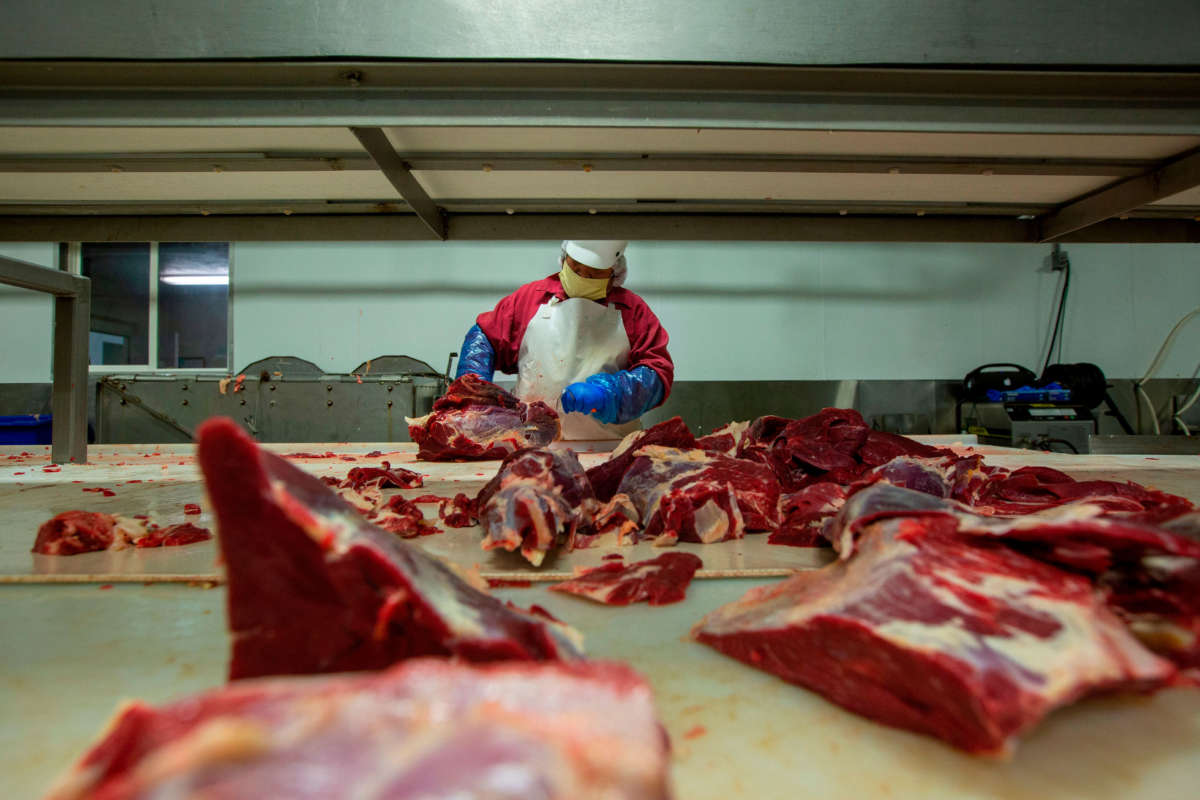Support justice-driven, accurate and transparent news — make a quick donation to Truthout today!
Workers at a number of meatpacking plants across the United States are being denied workers’ compensation packages by their employers, who are rejecting claims that workers contracted coronavirus while working on their premises.
The full picture of how many claims across the U.S. are being denied is unclear, due to the absence of a national claims database. However, based on reporting from the three states that do keep track of workers’ compensation claims, both approved and denied, most workers who say they contracted COVID-19 while working in meatpacking plants are being denied proper coverage, a report from Reuters uncovered.
While meatpacking plants are encouraged to have workers wear cloth masks and to socially distance as much as possible, a number of workers across the U.S. have reported that some employers were discouraging workers from wearing masks on the plant floors, while others also lacked enforcement of adequate distancing measures for workers, placing them in close proximity to each other.
In Minnesota, there were at least 930 applications by meatpacking workers from unnamed plants across the state who filed for compensation benefits related to COVID-19 infections. As of September 11, none of those claims had been accepted by the company, which had rejected 717 applications and had 213 still under review.
In Utah, as of August 1, there were seven COVID-related claims filed against JBS — one of the largest meat processing companies in the world — all of which had been denied.
Colorado shows a slightly better outcome but even there, 69 percent of the 2,294 workers’ compensation claims by meatpackers were denied.
Many of the denials in all three states appear to be on dubious grounds. For example, Saul Sanchez, a worker at the JBS plant in Greeley, Colorado, died in April due to complications from COVID-19. JBS, however, denied his family’s workers’ compensation and medical claims saying that it could not be definitively proved that he had contracted the disease while working at their plant, even though that facility had at least 291 cases of workers contracting coronavirus.
According to Sanchez’s family, he had not traveled anywhere and his contact with people outside of work was limited to his family and a very small group at a church where he worshipped. No one in that limited circle had tested positive for COVID.
Other companies have also denied workers’ compensation to those affected by COVID-19. In Iowa, workers’ attorneys speaking to Reuters said that Tyson had denied a number of applications for compensation.
The company would not expound upon how many applications it has denied, but one attorney who is representing the families of five Tyson workers who died of COVID said that claims from all five had been denied.
The Centers for Disease Control and Prevention (CDC) reported that, among 23 states where coronavirus outbreaks in plants were reported, at least 16,233 cases in 239 facilities were identified from the start of April through the end of May.
In spite of worries over workers getting sick from the disease, President Donald Trump issued an executive order at the end of April demanding that meatpacking and poultry plants remain open, using the Defense Production Act to deem them essential infrastructure for the United States. It is estimated that, within a month of that order being issued, coronavirus cases among meatpackers had tripled.
A terrifying moment. We appeal for your support.
In the last weeks, we have witnessed an authoritarian assault on communities in Minnesota and across the nation.
The need for truthful, grassroots reporting is urgent at this cataclysmic historical moment. Yet, Trump-aligned billionaires and other allies have taken over many legacy media outlets — the culmination of a decades-long campaign to place control of the narrative into the hands of the political right.
We refuse to let Trump’s blatant propaganda machine go unchecked. Untethered to corporate ownership or advertisers, Truthout remains fearless in our reporting and our determination to use journalism as a tool for justice.
But we need your help just to fund our basic expenses. Over 80 percent of Truthout’s funding comes from small individual donations from our community of readers, and over a third of our total budget is supported by recurring monthly donors.
Truthout has launched a fundraiser, and we have a goal to add 242 new monthly donors in the next 48 hours. Whether you can make a small monthly donation or a larger one-time gift, Truthout only works with your support.
